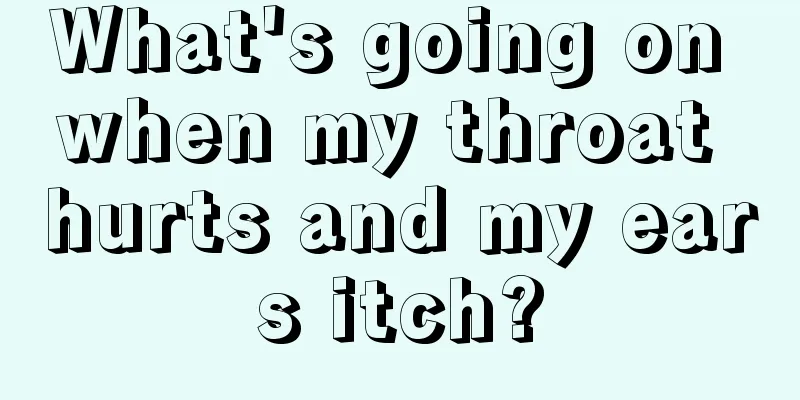What's going on when my throat hurts and my ears itch?

|
If you have a sore throat and itchy ears, you should pay attention to whether it is caused by acute pharyngitis. Because many people are prone to such conditions in life, you should also pay attention to the correct treatment methods, but be careful not to use antibiotics indiscriminately. 1. In acute pharyngitis, systemic toxic reactions such as fever, fear of cold, headache, body aches, poor appetite, dry stool and thirst may also occur except sore throat. If not treated in time or if recurring attacks occur, it may turn into a chronic disease; if the infection spreads upward and affects the ears and nose, it may lead to acute rhinitis, sinusitis, and acute otitis media; if it develops downward, it may invade the larynx, trachea and other lower respiratory tracts, causing acute laryngitis, tracheitis, bronchitis and pneumonia; if pathogenic bacteria and toxins invade the blood circulation, it may cause systemic complications, such as acute nephritis, sepsis, rheumatism, etc., which are extremely harmful to the body. 2. Currently, most drug treatments are for temporary control of the disease. Taking too many antibiotics is harmful to the human body because the abuse of antibiotics may lead to an imbalance of normal flora in the throat. It will cause bacteria to become more resistant to drugs and the body's immune function to weaken, making the disease recur and difficult to cure. If this type of drug is used for a long time and repeatedly, it will not only cause bacterial resistance or dysbiosis, but also cause side effects such as liver and kidney damage. Therefore, the use of antibiotics is generally not recommended for the treatment of pharyngitis, and reasonable treatment methods should be adopted under the guidance of a doctor. 3. Low-temperature plasma technology is used to treat pharyngitis, which overcomes many drawbacks of traditional drug treatment and invasive surgery in the treatment of throat diseases. It uses the energy of low-temperature plasma radio frequency to ablate and reduce the proliferative and hypertrophic pharyngitis of the posterior pharyngeal wall lymph follicle tissue at a lower temperature (about 40 to 70 degrees), thereby reducing tissue damage, greatly alleviating the patient's pain and shortening the recovery period. |
<<: What are the effects of wisdom tooth extraction
>>: Can people with 300-degree myopia not wear glasses?
Recommend
The best time to do foot fumigation
Fumigation with moxa is a traditional Chinese med...
What are the usual treatment measures for gallbladder cancer?
Gallbladder cancer is a common disease in our dai...
What are the main causes of colon cancer?
Many people who have colon cancer are worried tha...
What are the complications of severe pancreatitis
Severe pancreatitis not only affects the patient&...
What are the symptoms of scabies during the incubation period
Scabies is a disease that causes unbearable itchi...
Lanolin efficacy and function
Lanolin has good skin care, calming and moisturiz...
What is the cause of colorectal cancer
In recent years, colorectal cancer has become one...
What are the functions of Xuehai acupoint
There are so many acupuncture points distributed ...
Can broad beans and yam be eaten together?
Broad beans are foods with high nutritional value...
Typical causes of female ovarian tumors
Ovarian tumor disease is very harmful to our heal...
What causes acne around the lips
Lips are an important part of our face. We rely o...
Correct first aid measures for scalds and burns
Scalds and burns are common occurrences in daily ...
How should we care for acute mental disorders?
The pathogenesis of this disease is still not ver...
How long can you live with advanced lung cancer? How to take care of advanced lung cancer?
There is no way to judge how long patients with a...
How to wash tea stains
Drinking a cup of tea after a meal is a tradition...









